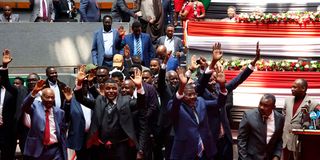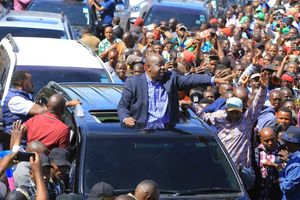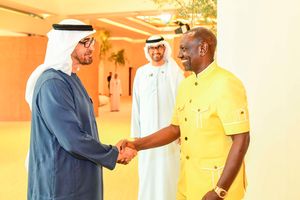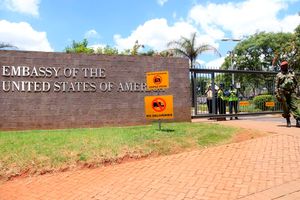
Delegates representing political parties affiliated to Sudan's Rapid Support Forces react to greetings at KICC, Nairobi on February 18, 2025, ahead of the planned signing of the Government of Peace and Unity Charter.
A smouldering diplomatic tiff with Sudan over Kenya’s decision to host a rebel group fighting the government raises the worrying question of whether East Africa’s largest economy is falling from its regional smart power status, giving rise to a rogue power.
Slightly over two years ago, few doubted that Kenya was Eastern Africa’s leading smart power nation. The East African nation’s elite honed the art and craft of mixing the soft power of persuasion, capacity building and development with the hard power of the military and defence as the moral and strategic foundations of the country’s well-known pragmatic diplomacy.
Smart power, then at the very heart of Kenya’s foreign policy, transformed the country into a benign regional power. Adored by its neighbours, Kenya was able to punch way above its weight in peacemaking, peacekeeping and humanitarian diplomacy.
The theory and practice of Kenya’s smart power sprung from rich the African heritage of nationalism-cum-Pan-Africanist ideology. This rendered a special moral shine to Kenya’s diplomacy.
Scholars have placed Kenya's Jomo Kenyatta, Tanzania's Julius Nyerere, and Ghana's Kwame Nkrumah in the same pantheon as the founders of pan-Africanism as a galvanizing moral and ideological force.
While globally known for his suspected leadership in the Mau-Mau revolt against British colonial rule, Kenyatta boldly adopted the idea of market and “socialism with African characteristics.” This was long before China, under Deng Xiaoping, adopted the capitalist market and “socialism with Chinese Characteristics”.
Following on Kenyatta’s footsteps in the 21st century, South Africa’s Thabo Mbeki and Senegal’s Abdoulaye Wade mounted the idea of African Renaissance on the trinity of nationalism, Pan-Africanism and the market as the cornerstone of Africa’s smart power to drive politics, development and diplomacy.
Dishonest diplomacy
In a distinct African context, a string of unprincipled or dishonest diplomacy are slowly turning Kenya into a “rogue power.” Kenya as a rogue power should not be confused with America’s manipulative use of the “rogue state” to label and isolate states which resist its global hegemony. But they share one aspect: an aggressive and undiplomatic behaviour that upsets peace and stability in an existing region or the international system. In the Cold War Africa, apartheid South Africa was a classic case of a rogue power in Africa supported by the West and Israel.
Why is Kenya tipping and stridently morphing into a rogue power on all fronts?
The answer is clear. Upon coming to power, the ‘hustler nation’ abandoned Kenya’s traditional diplomacy based on national interests and pan-Africanism and looked West.
Instead, the country shifted to what Senegalese Scholar and founding President sanitised as ‘EuraAfricanism’ to justify continued extra-colonial ties with France and the West. In a similar vein, during President Ruto’s visit to Capitol Hill in May 2024, President Joe Biden designated Kenya as a major non-North Atlantic Treaty Organization (NATO) US Ally (MNNA).
Kenya became the only country South of the Sahara in this hard-power status. But the cost has been dire. Nairobi has slavishly toed Washington’s global geopolitical line. This explains Kenya’s frightful foray into Haiti; the Israel-needs-protection-from-terrorist statement on the Israel/Palestine Conflict; sensational anti-Russian rhetoric in the United Nations Security Council; and public support for Ukraine’s President Volodymyr Zelenskyy.
Domestically, the plunge to a rogue power is evident in Kenya’s blatant abductions in violation of the International Convention for the Protection of All Persons from Enforced Disappearance in the Government’s clampdown on GenZ anti-tax revolt.
Regionally, a recent diplomatic tiff with Sudan signifies this shift. The ruling Sudanese Governing Council (SGG) has openly accused Kenya of meddling in its internal affairs and violating its sovereignty. On February 18, the world was struck mute by Kenya’s decision to allow the rebel Rapid Support Forces (RSF) fighting the government in Khartoum to convene in Nairobi reportedly to establish a parallel government in Sudan.
Sudan Sovereign Council
On February 19, the Vice-Chairman of the ruling Sudan Sovereign Council, Malik Agar Eyre, sent an open letter to President William Ruto, accusing Kenya of indulging in practice that amount to a “violation of the AU principles” aimed at maintaining peace and tranquillity among Africa’s 55 member states.
Malik outlined Kenya’s assault on Sudan’s sovereignty. On June 10-14, 2023, as the Chairman of IGAD during the meeting of IGAD head of states in Djibouti, Ruto bilaterally announced a four-country mechanism (South Sudan, Djibouti, Uganda and Kenya ) of which he included Kenya as the Chairman. According to Malik, this decision “was neither ratified by the Sudanese government nor agreed upon by the IGAD assembly.” On September 18, 2024, during the extraordinary meeting of IGAD held in Uganda Ruto, Sudan states, introduced Sudanese matters into discussions that were called exclusively to discuss Somalia. Worse still, Kenya stoked tensions by proposing that the RSF sit on the Chair reserved for Sudan. UN and AU norms do not allow a non-state holder, let alone a rebel group, to participate in State meetings.
Further, on February 14, the recently concluded AU summit stressed Africa’s commitment to uphold the territorial integrity and unity of Sudan. Kenya’s hosting of RSF rebels in Nairobi violated this commitment. As pressure mounted on Kenya and RSF, the Special Advisor the militia’s Commander, Izzadin Al Safi, was forced to explain their presence in Kenya. “We are in Kenya not to establish a government”, said their statement. “Kenya serves as a neutral ground for facilitation and dialogue”, it added.
On his part, Kenya's Prime Cabinet Secretary and Cabinet Secretary for Foreign and Diaspora Affairs, Musalia Mudavadi, said on February 19 that Kenya was unapologetic for hosting the rebel group. He said hosting the group was the first step in supporting peace efforts in Sudan, arguing that Kenya was offering a non-partisan platform. It gave this space “without any ulterior motives”. He denied that Kenya had violated Sudan's sovereignty.
On February 20, Sudan recalled its ambassador to Kenya, Kamal Jabara. The war-torn country accused President Ruto of “prioritizing commercial and personal interests over historic bilateral relations” with Sudan. With this, Kenya is losing its shine and influence as a credible regional power.
Professor Peter Kagwanja is consultant and Government Adviser and Chief Executive of the Africa Policy Institute (API).










